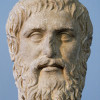“ For no one would maintain that he is happy who has not in him a particle of courage or temperance or justice or prudence, who is afraid of every insect which flutters past him, and will commit any crime, however great, in order to gratify his lust of meat or drink, who will sacrifice his dearest friend for the sake of half-a-farthing, and is as feeble and false in mind as a child or a madman. ”
Aristotle, Politics (4th century BC). copy citation
| Author | Aristotle |
|---|---|
| Source | Politics |
| Topic | justice courage |
| Date | 4th century BC |
| Language | English |
| Reference | |
| Note | Translated by Benjamin Jowett |
| Weblink | http://classics.mit.edu/Aristotle/politics.html |
Context
“Certainly no one will dispute the propriety of that partition of goods which separates them into three classes, viz., external goods, goods of the body, and goods of the soul, or deny that the happy man must have all three. For no one would maintain that he is happy who has not in him a particle of courage or temperance or justice or prudence, who is afraid of every insect which flutters past him, and will commit any crime, however great, in order to gratify his lust of meat or drink, who will sacrifice his dearest friend for the sake of half-a-farthing, and is as feeble and false in mind as a child or a madman. These propositions are almost universally acknowledged as soon as they are uttered, but men differ about the degree or relative superiority of this or that good. Some think that a very moderate amount of virtue is enough, but set no limit to their desires of wealth, property, power, reputation, and the like.”
source



